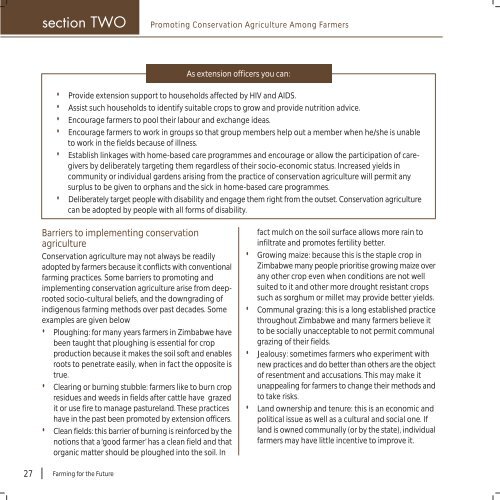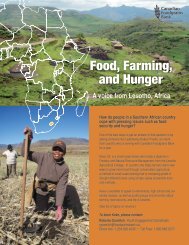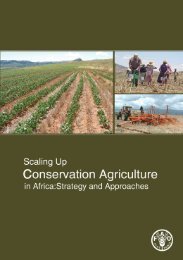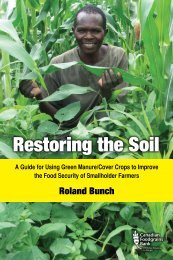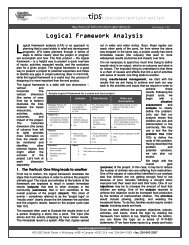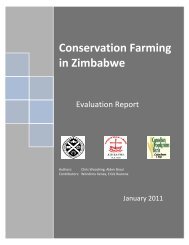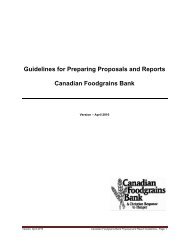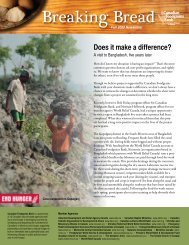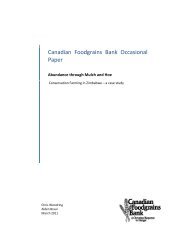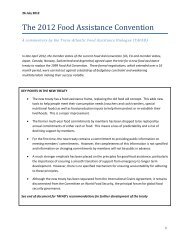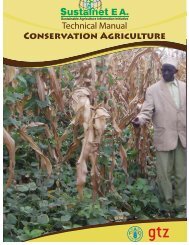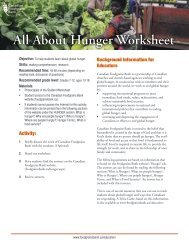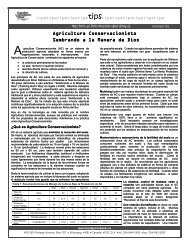A Guide to Conservation Agriculture in Zimbabwe - Canadian ...
A Guide to Conservation Agriculture in Zimbabwe - Canadian ...
A Guide to Conservation Agriculture in Zimbabwe - Canadian ...
Create successful ePaper yourself
Turn your PDF publications into a flip-book with our unique Google optimized e-Paper software.
section TWO<br />
Promot<strong>in</strong>g <strong>Conservation</strong> <strong>Agriculture</strong> Among Farmers<br />
As extension officers you can:<br />
• Provide extension support <strong>to</strong> households affected by HIV and AIDS.<br />
• Assist such households <strong>to</strong> identify suitable crops <strong>to</strong> grow and provide nutrition advice.<br />
• Encourage farmers <strong>to</strong> pool their labour and exchange ideas.<br />
• Encourage farmers <strong>to</strong> work <strong>in</strong> groups so that group members help out a member when he/she is unable<br />
<strong>to</strong> work <strong>in</strong> the fields because of illness.<br />
• Establish l<strong>in</strong>kages with home-based care programmes and encourage or allow the participation of caregivers<br />
by deliberately target<strong>in</strong>g them regardless of their socio-economic status. Increased yields <strong>in</strong><br />
community or <strong>in</strong>dividual gardens aris<strong>in</strong>g from the practice of conservation agriculture will permit any<br />
surplus <strong>to</strong> be given <strong>to</strong> orphans and the sick <strong>in</strong> home-based care programmes.<br />
• Deliberately target people with disability and engage them right from the outset. <strong>Conservation</strong> agriculture<br />
can be adopted by people with all forms of disability.<br />
Barriers <strong>to</strong> implement<strong>in</strong>g conservation<br />
agriculture<br />
<strong>Conservation</strong> agriculture may not always be readily<br />
adopted by farmers because it conflicts with conventional<br />
farm<strong>in</strong>g practices. Some barriers <strong>to</strong> promot<strong>in</strong>g and<br />
implement<strong>in</strong>g conservation agriculture arise from deeprooted<br />
socio-cultural beliefs, and the downgrad<strong>in</strong>g of<br />
<strong>in</strong>digenous farm<strong>in</strong>g methods over past decades. Some<br />
examples are given below<br />
• Plough<strong>in</strong>g: for many years farmers <strong>in</strong> <strong>Zimbabwe</strong> have<br />
been taught that plough<strong>in</strong>g is essential for crop<br />
production because it makes the soil soft and enables<br />
roots <strong>to</strong> penetrate easily, when <strong>in</strong> fact the opposite is<br />
true.<br />
• Clear<strong>in</strong>g or burn<strong>in</strong>g stubble: farmers like <strong>to</strong> burn crop<br />
residues and weeds <strong>in</strong> fields after cattle have grazed<br />
it or use fire <strong>to</strong> manage pastureland. These practices<br />
have <strong>in</strong> the past been promoted by extension officers.<br />
• Clean fields: this barrier of burn<strong>in</strong>g is re<strong>in</strong>forced by the<br />
notions that a ‘good farmer’ has a clean field and that<br />
organic matter should be ploughed <strong>in</strong><strong>to</strong> the soil. In<br />
fact mulch on the soil surface allows more ra<strong>in</strong> <strong>to</strong><br />
<strong>in</strong>filtrate and promotes fertility better.<br />
• Grow<strong>in</strong>g maize: because this is the staple crop <strong>in</strong><br />
<strong>Zimbabwe</strong> many people prioritise grow<strong>in</strong>g maize over<br />
any other crop even when conditions are not well<br />
suited <strong>to</strong> it and other more drought resistant crops<br />
such as sorghum or millet may provide better yields.<br />
• Communal graz<strong>in</strong>g: this is a long established practice<br />
throughout <strong>Zimbabwe</strong> and many farmers believe it<br />
<strong>to</strong> be socially unacceptable <strong>to</strong> not permit communal<br />
graz<strong>in</strong>g of their fields.<br />
• Jealousy: sometimes farmers who experiment with<br />
new practices and do better than others are the object<br />
of resentment and accusations. This may make it<br />
unappeal<strong>in</strong>g for farmers <strong>to</strong> change their methods and<br />
<strong>to</strong> take risks.<br />
• Land ownership and tenure: this is an economic and<br />
political issue as well as a cultural and social one. If<br />
land is owned communally (or by the state), <strong>in</strong>dividual<br />
farmers may have little <strong>in</strong>centive <strong>to</strong> improve it.<br />
27 Farm<strong>in</strong>g for the Future


